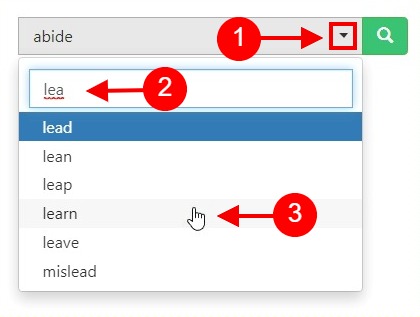Časování pravidelného slovesa [ascertain]
Časování neboli konjugace je způsob ohýbání sloves. Změna jejich tvaru, nejčastěji pomocí koncovek a pomocných slov, slouží k vyjádření mluvnických slovesných kategorií, jako jsou osoba, číslo, čas, vid, rod a způsob, které se vztahují k ději či stavu, jež sloveso popisuje. Podle formy časování se slovesa rozdělují na různé třídy (v latině nazývané konjugace), kterým jsou přiřazeny vzory, podle nichž se slovesa v dané třídě časují.
Rozeznáváme slovesné tvary jednoduché (např. dělat, dělám) a složené (např. dělal jsem, budu dělat).
Celkově má angličtina 12 základních časů. Ne se všemi se však při běžném rozhovoru s rodilým Angličanem či Američanem setkáte.
Podmiňovací způsob
(Conditional)
pravidelného slovesa [ascertain]
Podmiňovací způsob (kondicionál) je slovesný způsob, jímž se vyjadřuje, že uskutečnění určitého děje nebo stavu je podmíněno jistými okolnostmi. Kondicionál je rovněž možné využít k vyjádření zdvořilé žádosti (mohl byste mi prosím říci…?).
V angličtině se přítomný kondicionál tvoří pomocí pomocného slova would a slovesa v základním tvaru (infinitivu).
Pro tvoření minulého kondicionálu se používá minulý infinitiv, tj. konstrukce would have + příčestí trpné. V angličtině je nutné správně rozlišovat mezi minulým a přítomným kondicionálem.
Kondicionál přítomný
(Conditional present)
Kondicionál přítomný průběhový
(Conditional present progressive)
Kondicionál minulý
(Conditional perfect)
Konjunktiv
(Subjunktiv)
pravidelného slovesa [ascertain]
Konjunktiv (z pozdně latinského modus coniunctivus, v překladu způsob sloužící k větné vazbě, z lat. coniungere – spojovat) či (v angličtině) subjunktiv).
Konjunktiv je slovesný způsob, který vyjadřuje zpravidla podmíněnost či hypotetičnost děje.
Vyjadřuje akce možné, pravděpodobné, hypotetické, žádoucí, obávané nebo potřebné (slouží tak k vyjádření postojové modality mluvčího). Je to způsob akcí myšlených, které se nemusí stát v žádném časovém bodě. Označuje především subjektivnost, pochybnosti či nejistotu sdělení.
Konjunktiv přítomný
(Present subjunctive)
Konjunktiv minulý
(Past subjunctive)
Rozkazovací způsob
(Imperativ)
pravidelného slovesa [ascertain]
Rozkazovací způsob či imperativ (z latinského imperativus) je slovesný způsob, jímž se vyjadřuje příkaz, požadavek či zákaz. V mnoha případech může znít použití rozkazovacího způsobu hrubě a nezdvořile. Rozkaz proto bývá mnohdy opisován zdvořilejší cestou skrze použití jiného způsobu.
Ve většině jazyků se rozkazovací způsob používá zejména ve 2. osobě, k níž se mluvčí obvykle obrací. V písmu se výpovědi obsahující rozkazovací způsob ukončují:
- vykřičníkem, jedná-li se o kategorický požadavek (Okamžitě odejdi!);
- v ostatních případech tečkou, jedná-li se zejména o zdvořilou žádost (Prosím, otevři okno.).
V angličtině se rozkazovací způsob 2. osoby (jednotného i množného čísla) shoduje s infinitivem (bez částice to):
- (to) do = dělat, do! = dělej! dělejte!
- V jiných osobách se opisuje vazbou se slovesem let (nechat) a předmětovým pádem osobního zájmena, nejčastěji v 1. osobě množného čísla:
- let us (= let's) go! = pojďme!
Příčestí
(Participle)
pravidelného slovesa [ascertain]
Příčestí (participium, z latinského participare – „mít účast“) je neurčitý jmenný tvar slovesa, který má v jazyce různé funkce:
- účast na tvorbě složených slovesných časů;
- účast na tvorbě trpného rodu;
- funkce přívlastku;
- alternativa k vedlejším větám (větné kondenzátory);
- a jiné.
Příčestí jsou často základem tvorby přídavných jmen (deverbální adjektiva), např. koupen - koupený, minul - minulý, a podstatných jmen (deverbální substantiva), zakoupen - zakoupení.
Využijte tlačítko "Náhodná volba"
| Začít se studiem nepravidelných sloves: |
| Náhodná volba = >> |
Anglická nepravidelná slovesa snadno a rychle!
